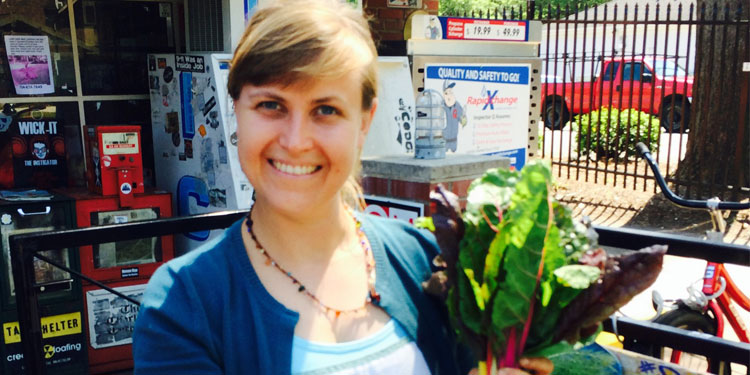Elizabeth Anne Dover, 30, is doing exactly what she wanted to do when she grew up. She’s a full-time farmer, flirting with break-even, selling her product, from Cherokee Purple tomatoes to wine, at farmer’s markets all around Charlotte. “We just have to get bigger,” she says.
She plants 10 acres on Hwy. 29, just north of the Speedway and south of Christy’s Nursery. The name of the business is hip and market-savvy: The Farms at Dover Vineyards. Her staff members run booths at various farmer’s markets ranging from NoDa in Charlotte to downtown Davidson and Rotary Square in Concord. Bottles of wines made from Chambourcin, a French-American hybrid, run $20.
“The ROI for wine is about 10 years,” she says.
She expects to be profitable in about four years. Of course, having family farmland helps the financial picture, as does the former Dover family grocery store on West Cabarrus Avenue where she can sell her wine.
“No farms out there are making a killing. The whole point out there is to preserve the farming way of life,” she says. Competition is fierce. Big commercial farms and agribusiness operations can produce more at a lower cost—one reason most grocery store tomatoes have that tasteless pink-yellow variety. Then, too, hobby growers undercut everyone’s prices, but they come and go.
“They sell tomatoes for $1 a pound…but the real cost is $2.50 to $3 a pound,” Dover says.
With a drought officially settling over the region, farmers are tweaking their product lines—and irrigating more—to maintain production the best they can. But it will affect quality, quantity and price.
Brent Barbee of Barbee Farms on Shelton Road, said he is pumping a lot of water from seven wells right now on his 70 acres, adding that everything they plant has to have irrigation. Crops like tomatoes and bell peppers will use as much water as you can give them daily with the irrigation equipment they use.
“So it’s pretty much turn it on and leave it on,” Barbee said.
The drought has not made a big dent in product production, Barbee said, but it has made a dent on their bottom line at the farm because of the costs associated with running the wells for irrigation as opposed to free rain water.
“We’ve got two wells hooked to one power service and last month that power service was at $350 just to pump two wells,” he stated. “But then again you can have too much rain. My great grandfather always said, ‘A dry year will always worry you to death, a wet year will bust you.’ And that’s pretty much close to the truth.”
Barbee picks corn as-needed and squash, zucchini and tomatoes every other day. They grab product out of the cooler to stock in their own store or to take to farmer’s markets, grocery stores like Lowe’s Foods and Harris-Teeter and to local restaurants.
“That’s something we just started this year and it’s been a really good relationship,” Barbee said of his partnership with grocers.


Discussion
No comments yet.